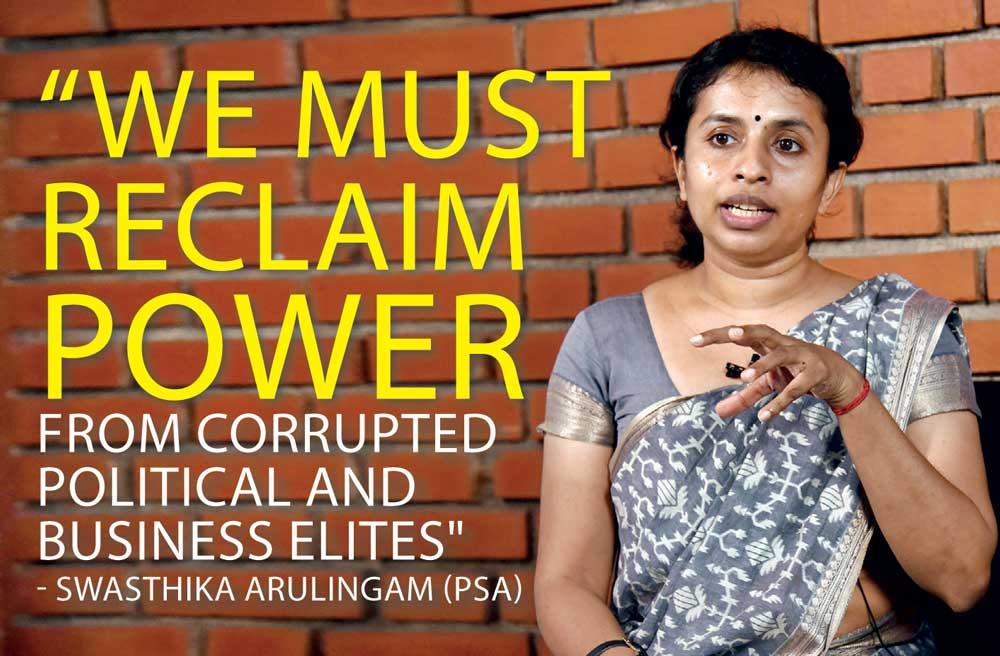09 Nov 2024 - {{hitsCtrl.values.hits}}

| The People’s Struggle Alliance is contesting in this election to change the opposition in Parliament |
| The Aragalaya (Protest) made me realise that State power is important to give power to our politics |
| Being a woman and coming from a minority community shaped my understanding of how racism and sexism operate in society |
| My experience as a Tamil woman shaped my politics |
 Passed out as a lawyer from the Colombo Law College and having two Master-LLM from the University of Colombo and a LLM and Development as a Chevening Scholar at School of Oriental and African Studies, University of London, young activist Swastika Arulingam was a prominent figure in the Aragalaya (Protest) which toppled the Gotabaya Rajapaksa government. She has been a fearless voice and as a legal representative played her part to protect those who were beaten up by political goons of Rajapaksa government and those taken into custody and incarcerated on various allegations. Representing the minority Tamils and female community, Swasthika has been a symbol of courage and justice for many young men and women. Displaced from the North during the height of war and settled in Colombo, Swasthika studied at Ladies’ College, Colombo and was into activism as soon as she passed out as an attorney-at-law. She joined the Legal Aid Commission to start her first job. Swasthika has fought on behalf of marginalised and oppressed individuals who were denied of justice. Going a step further she took up the role to champion for the rights of workers and became the presidents of the Commercial and Industrial Workers Union (CIWU) in 2022 and the United Federation of Labour (UFL) in 2023. Fighting for a system change against the traditional political system in the country, Swasthika together with other leaders at the Aragalaya campaign- which was started at Galle Face- formed the People Struggle Alliance (PSA), a political movement to win the mandate of the people. She is contesting from the Colombo District at the upcoming Parliamentary Elections.
Passed out as a lawyer from the Colombo Law College and having two Master-LLM from the University of Colombo and a LLM and Development as a Chevening Scholar at School of Oriental and African Studies, University of London, young activist Swastika Arulingam was a prominent figure in the Aragalaya (Protest) which toppled the Gotabaya Rajapaksa government. She has been a fearless voice and as a legal representative played her part to protect those who were beaten up by political goons of Rajapaksa government and those taken into custody and incarcerated on various allegations. Representing the minority Tamils and female community, Swasthika has been a symbol of courage and justice for many young men and women. Displaced from the North during the height of war and settled in Colombo, Swasthika studied at Ladies’ College, Colombo and was into activism as soon as she passed out as an attorney-at-law. She joined the Legal Aid Commission to start her first job. Swasthika has fought on behalf of marginalised and oppressed individuals who were denied of justice. Going a step further she took up the role to champion for the rights of workers and became the presidents of the Commercial and Industrial Workers Union (CIWU) in 2022 and the United Federation of Labour (UFL) in 2023. Fighting for a system change against the traditional political system in the country, Swasthika together with other leaders at the Aragalaya campaign- which was started at Galle Face- formed the People Struggle Alliance (PSA), a political movement to win the mandate of the people. She is contesting from the Colombo District at the upcoming Parliamentary Elections.
Excerpts:

 Having started as a displaced person due to the civil war in North, what inspired you to become an activist and a fighter for human rights?
Having started as a displaced person due to the civil war in North, what inspired you to become an activist and a fighter for human rights?
I was very small when my family was displaced and ended up in Colombo due to the war. My parents and grandparents struggled in the early days like all internally displaced Tamil families. The war period was a dangerous time for Tamils living in the South. We were racially profiled by the state and were targets under Emergency regulations and the prevention of terrorism act. Being a woman and coming from a minority community shaped my understanding of how racism and sexism operates in society and how these factors contribute to state brutality and oppression. These experiences shaped me to be part of larger struggles for a more equal state and society.
 Your extraordinary role was seen during the Aragalaya (protest) and the campaigns thereafter. What impact did the Aragalaya have on your journey to turn from activism to politics?
Your extraordinary role was seen during the Aragalaya (protest) and the campaigns thereafter. What impact did the Aragalaya have on your journey to turn from activism to politics?
The Argalaya was a historical moment for all of us. We has never seen something like this before in Sri Lanka and in recent times in the world as well. That is why the Sri Lankan Aragalaya continues to be a learning political moment for scholars and activists in Sri Lanka and around the world. However the Aragalaya (Protest) made me realise that State power is important to give power to our politics. It made me realise that the Parliament has been mostly silent on working class issues, have been actively passing policies and laws to keep workers dispossessed, have been antagonistic towards protecting women, members of the LGBTQIA community, have shielded, protected and inflamed racism inside society have been silent on the issue of caste despite the fact that caste is pervasive across the country. So it was after the Aragalaya that I started thinking about state power and electoral politics.
 ‘Politician’ is a title that has a negative connotation in the present context of Sri Lanka. Why do you want to be one of them?
‘Politician’ is a title that has a negative connotation in the present context of Sri Lanka. Why do you want to be one of them?
We have allowed politics to be in the hands of a few political and business elites who have used that state power and corrupted our system. We must reclaim that space. We must be inside and outside the space and be the corridor for people to be part of state power. That is precisely why in the People’s Struggle Alliance Manifesto we have spoken about direct political participation of the people in State power through structures such as the people’s councils.
 What are the main aims of People Struggle Alliance (PSA) in contesting for the upcoming election?
What are the main aims of People Struggle Alliance (PSA) in contesting for the upcoming election?
The People’s Struggle Alliance is contesting in this election to change the opposition in Parliament. Historically as much as Governments have acted abusively towards the people, the opposition also has been the problem. I still remember the time when an Amendment to the land development ordinance was brought to Parliament there was only one MP who was willing to debate the issue. At that time I could not understand why MPs in Parliament could not understand how neoliberal states create structures to dispossess small scale farmers of lands. Further the bureau of rehabilitation Act was passed with only 29 MPs even voting. This is how the opposition has acted in the past. We want to be the opposition who supports the Government when it passes laws and policies for the people and strongly opposes when the Government acts abusively towards the people.
 Representing one of the minority communities and also being a woman, why is it important for you to be elected to Parliament?
Representing one of the minority communities and also being a woman, why is it important for you to be elected to Parliament?
Representation is important. My experience as a Tamil woman shaped my politics. My experience as Trade Union leader shaped my politics about the understanding of class, race and gender cross cutting and intersecting all aspects of our life. That is the politics which bought me together with my comrades in the Peoples Struggle Alliance. The Parliament must be a space which is inclusive and representative of all ethnicities, caste and gender. It must also be a space where workers have representatives to speak for them. I am a woman, a Tamil and a Trade Unionist. The people and the politics we represent must have a space in Parliament.
 Why do you want to be a politician when you can do more work being an independent activist and a legal professional?
Why do you want to be a politician when you can do more work being an independent activist and a legal professional?
I was independent to a political party, but my politics was shaped by left political thinking. Hence I do not claim to be politically neutral.
Becoming a politician gives us access to State power and to shape the politics of the State which is currently neoliberal. The Parliament is only one space to take our politics forward. This time around we want to be part of that space as well.
However we are conscious that society cannot be reformed through Parliament. Systems are not changed through Parliament. People wanted a system change. A system overhaul. That can only be achieved through a sustained people’s movement and sustained people’s struggles. The Parliament can only be a space to echo and strengthen that struggle inside the formal state structure. As the PSA we are hoping we would contribute to ensuring People’s demands are heard and represented in Parliament.
Pic by Nisal Baduge
06 Jan 2025 2 hours ago
06 Jan 2025 2 hours ago
06 Jan 2025 2 hours ago
06 Jan 2025 2 hours ago
06 Jan 2025 3 hours ago